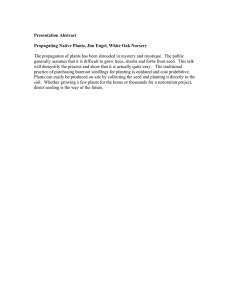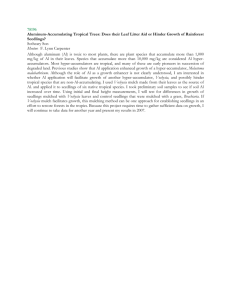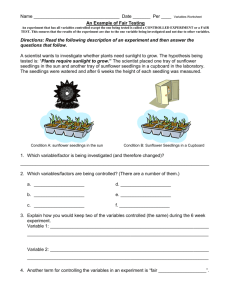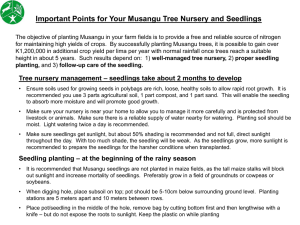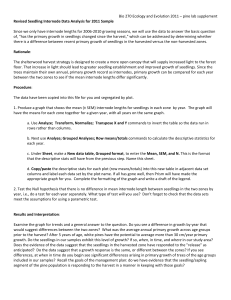Pre Planting Considerations
advertisement
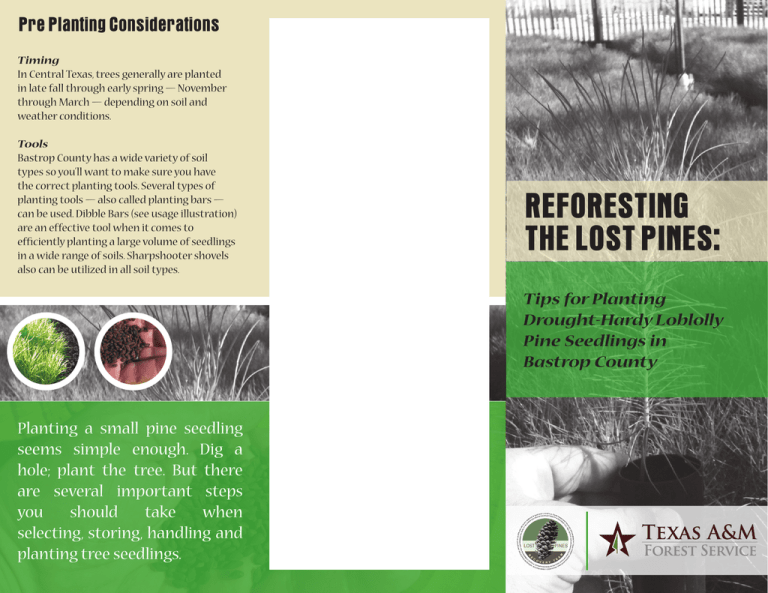
Pre Planting Considerations Timing In Central Texas, trees generally are planted in late fall through early spring — November through March — depending on soil and weather conditions. Tools Bastrop County has a wide variety of soil types so you’ll want to make sure you have the correct planting tools. Several types of planting tools — also called planting bars — can be used. Dibble Bars (see usage illustration) are an effective tool when it comes to efficiently planting a large volume of seedlings in a wide range of soils. Sharpshooter shovels also can be utilized in all soil types. REFORESTING THE LOST PINES: Tips for Planting Drought-Hardy Loblolly Pine Seedlings in Bastrop County Planting a small pine seedling seems simple enough. Dig a hole; plant the tree. But there are several important steps you should take when selecting, storing, handling and planting tree seedlings. REFORESTING THE LOST PINES Three Steps to Successful Planting Step I: Selecting the Seedlings Step II: Seedling Storage • Always select tree species that are native to the Bastrop area. Avoid non-native or exotic species. Generally, seedlings should be planted as soon as you receive them. However, in ideal conditions, most seedlings can be stored up to 10 weeks as long as storage temperatures remain between 35 to 38 degrees. • Choose tree species that are suitable for your soil, geographic location and forest management goals. • Decide if you want to plant containerized or bare-root seedlings (both require proper storage and handling): • Containerized Seedlings: A containerized seedling has a small plug of soil encapsulating and protecting its roots. These seedlings are recommended for reforestation projects in and around Bastrop County. • Bare-root Seedlings: As their name implies, bare-root seedlings have no soil surrounding their roots. These seedlings are site-specific and should be targeted for use in planting areas with deep, soils. Landowners should consult with a forestry professional prior to planting bare-root seedlings. NOTE: If you’re selecting Loblolly Pine Seedlings, choose only the drought-hardy seedlings grown from the local Lost Pines seed source to ensure genetic purity. Sources for these droughthardy, Lost Pines seedlings, as well as other species of native hardwoods, are available on the Lost Pines Recovery Team website: http://bastroprecovery.org. •D o not prune or cut-off any parts of the seedling, especially its roots. • E xamine each seedling before planting and discard the seedlings that have any of the following characteristics: • Seedlings come packaged from the nursery either in paper sacks or cardboard boxes. Keep seedlings within their original packaging until time for planting. Keep the bag or box tightly sealed to keep moisture inside. Tape over any tears or holes in the packaging immediately. • Store seedlings in a cool, ventilated, shaded location sheltered from the wind. Do not allow seedlings to freeze or come into contact with direct sunlight. • I f possible, avoid planting trees on days that are windy, have low humidity or temperatures above 85 degrees. Plant trees when soil conditions are favorable; avoid saturated soils with standing water, frozen soils or very loose, dry soils that have little soil moisture. • Don’t stack more than three seedling boxes on top of each other. Be sure there are gaps between each stack to allow for air circulation. Step III: Handling Tree Seedlings Handle seedlings with care! Seedlings are delicate and can be damaged easily. They can snap, be stripped of their thin bark or suffer damage to their fine roots. Do not plant a seedling that has sustained damage. • Broken stem or primary root •B ark that has been skinned off or rubs off easily • Pine needles with mold or mildew • Dried-out roots • Warm to the touch •B are-root seedlings often have their roots coated with a water-clay slurry that keeps them moist while in their packaging. Leave this coating on the roots. More Information For more information about the restoration of Bastrop’s Lost Pines forest, as well ongoing events and seedling availability, visit: http://bastroprecovery.org. For more information about tree planting, visit the Texas A&M Forest Service website at http://tfsweb.tamu.edu. To view an instructional tree planting video, visit www.youtube.com/texasforestservice.
